One of the most significant benefits of sea moss is its ability to promote healthy hair growth and improve the overall condition of the hair for all hair types. In this article, we will explore the benefits of sea moss for hair and provide tips on how to incorporate it into your hair care routine and diet.
Sea Moss and Hair
What is Sea Moss?
Sea moss, also known as Irish moss or carrageen moss, is a type of seaweed that has been touted for its numerous health benefits. Sea moss is harvested from the oceans of the Atlantic and the African and Caribbean waters and then sun-dried for several days. It is then cleaned and processed into a powder or gel form for consumption or for body care. Sea moss is known for its high concentration of essential vitamins and minerals, including calcium, magnesium, potassium, and iodine. It also contains amino acids, antioxidants, and other beneficial compounds.
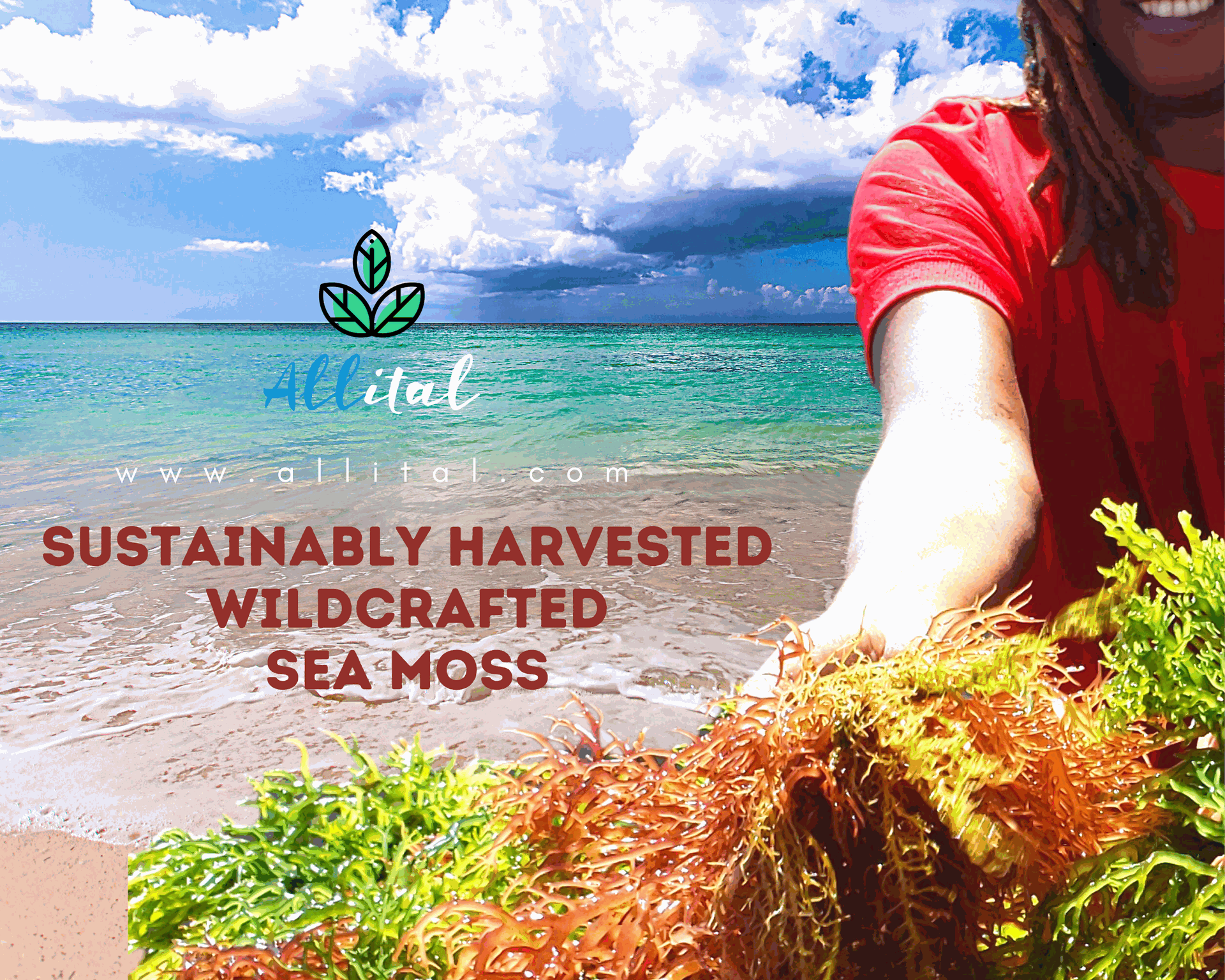
The Health Benefits of Sea Moss
Boosts Immunity
One of the primary health benefits of sea moss is its ability to boost the immune system. Sea moss contains a high concentration of vitamins and minerals that are essential for optimal immune function, including vitamin C, vitamin A, and zinc. These nutrients work together to enhance the body's ability to fight off infections and diseases.
Supports Digestive Health
Sea moss is also known for its ability to promote digestive health. It contains a high concentration of prebiotic fiber, which helps to feed the beneficial bacteria in the gut. This can lead to improved digestion, reduced inflammation, and better overall gut health.
Promotes Healthy Skin
Sea moss is rich in sulfur, which is a mineral that is essential for healthy skin. Sulfur helps to improve skin elasticity, reduce the appearance of wrinkles, and promote a youthful glow. Additionally, sea moss contains vitamin E, which is a potent antioxidant that can help to protect the skin from damage caused by free radicals.

Enhances Energy and Endurance
Sea moss is a natural source of electrolytes, such as sodium, calcium, phosphate and magnesium which are essential for maintaining proper hydration and energy levels. It is also rich in iron, which is a mineral that is necessary for the production of hemoglobin, a protein that carries oxygen throughout the body. Consuming sea moss can help to increase energy and endurance levels, making it a great option for athletes and fitness enthusiasts.
Supports Thyroid Function
Sea moss is a rich source of iodine, which is a mineral that is essential for proper thyroid function. The thyroid gland relies on iodine to produce hormones that regulate metabolism and other bodily functions. Consuming sea moss can help to support healthy thyroid function and prevent iodine deficiency.
How to Incorporate Sea Moss into Your Diet
There are several ways to incorporate sea moss into your diet.
- One popular option is to add sea moss gel to smoothies or juices for an extra nutritional boost.
- Sea moss can also be used as a thickener in soups and stews or as a natural binder in vegan recipes.
- It can even be used to make a nutrient-rich face mask for healthy skin.
Sea Moss Nutrients: Promote Healthy Hair for All Hair Types
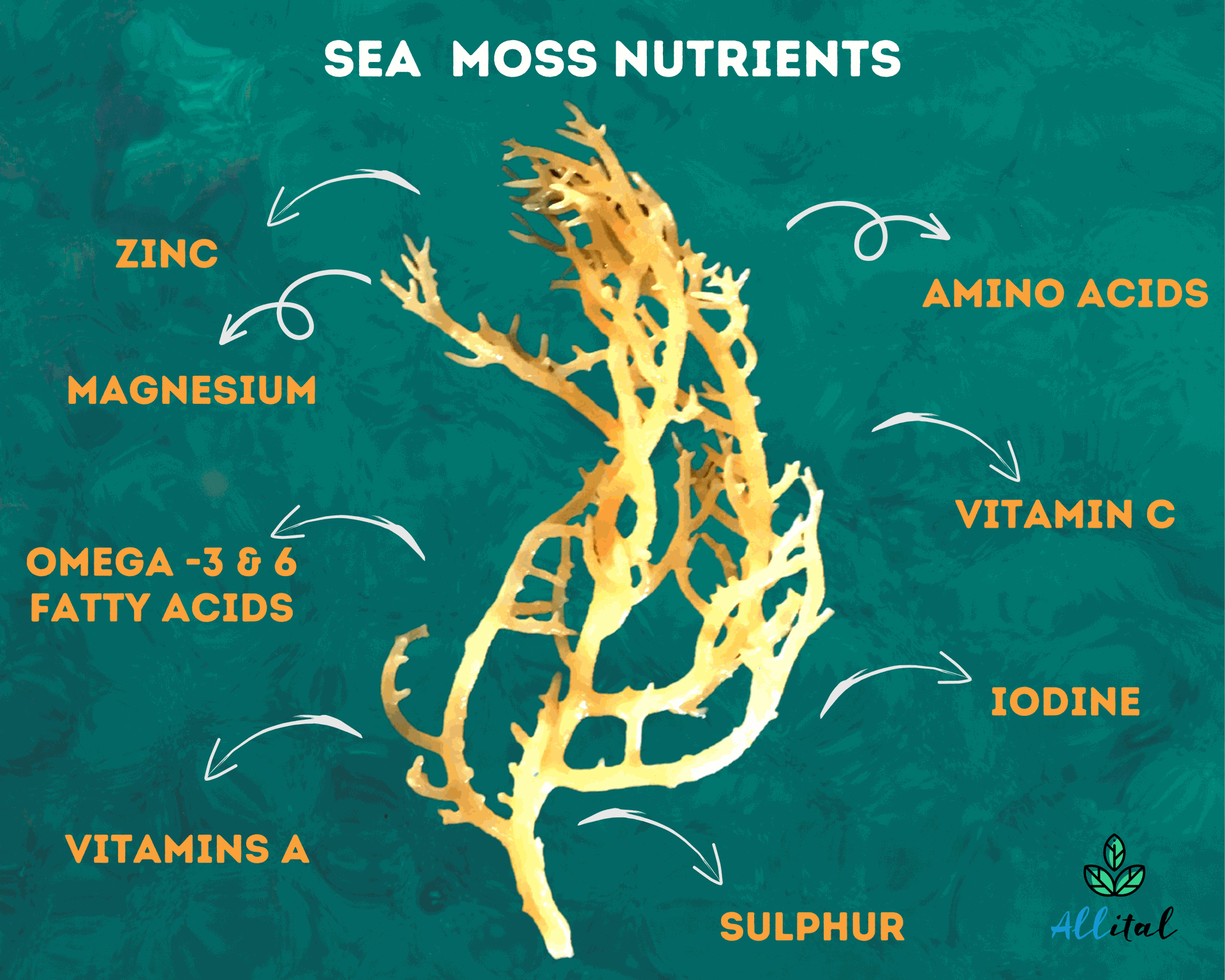
Sea moss is a nutrient-rich seaweed that offers many benefits for all hair types. Some of the key nutrients found in sea moss that promote healthy hair include:
Calcium: Calcium is essential for maintaining strong hair strands and preventing hair breakage.
Iron: Iron is important for healthy blood circulation, which is necessary for promoting healthy hair growth.
Magnesium: Magnesium helps to regulate calcium levels in the body and can help to prevent hair loss.
Vitamin A: Vitamin A is essential for maintaining a healthy scalp and promoting healthy hair growth.
Vitamin C: Vitamin C helps to boost collagen production, which is important for maintaining strong and healthy hair.
Iodine: Iodine is necessary for maintaining a healthy thyroid gland, which is important for promoting healthy hair growth and preventing hair loss.
Collagen: Collagen is a protein that is essential for healthy hair, skin, and nails. It helps to improve the elasticity and strength of hair strands, reducing the risk of breakage and split ends.
Amino Acids: Amino acids are the building blocks of proteins, and they are essential for healthy hair growth.
Antioxidants: Sea moss is rich in antioxidants, which can help to protect hair follicles from damage caused by free radicals.
By incorporating sea moss into your diet or hair care routine, you can provide your hair with these essential nutrients and promote healthy hair growth and overall hair health.
The Benefits of Sea Moss for All Hair Types
Promotes Hair Growth
One of the primary benefits of sea moss for hair is its ability to promote hair growth. Sea moss is rich in vitamins and minerals that are essential for healthy hair growth, including vitamin A, vitamin C, and iron. These nutrients work together to strengthen hair follicles and promote the growth of new hair.
Improves Hair Condition
Sea moss is also known for its ability to improve the overall condition of the hair. It contains a high concentration of collagen, which is a protein that is essential for healthy hair, skin, and nails. Collagen helps to improve the elasticity and strength of hair strands, reducing the risk of breakage and split ends.
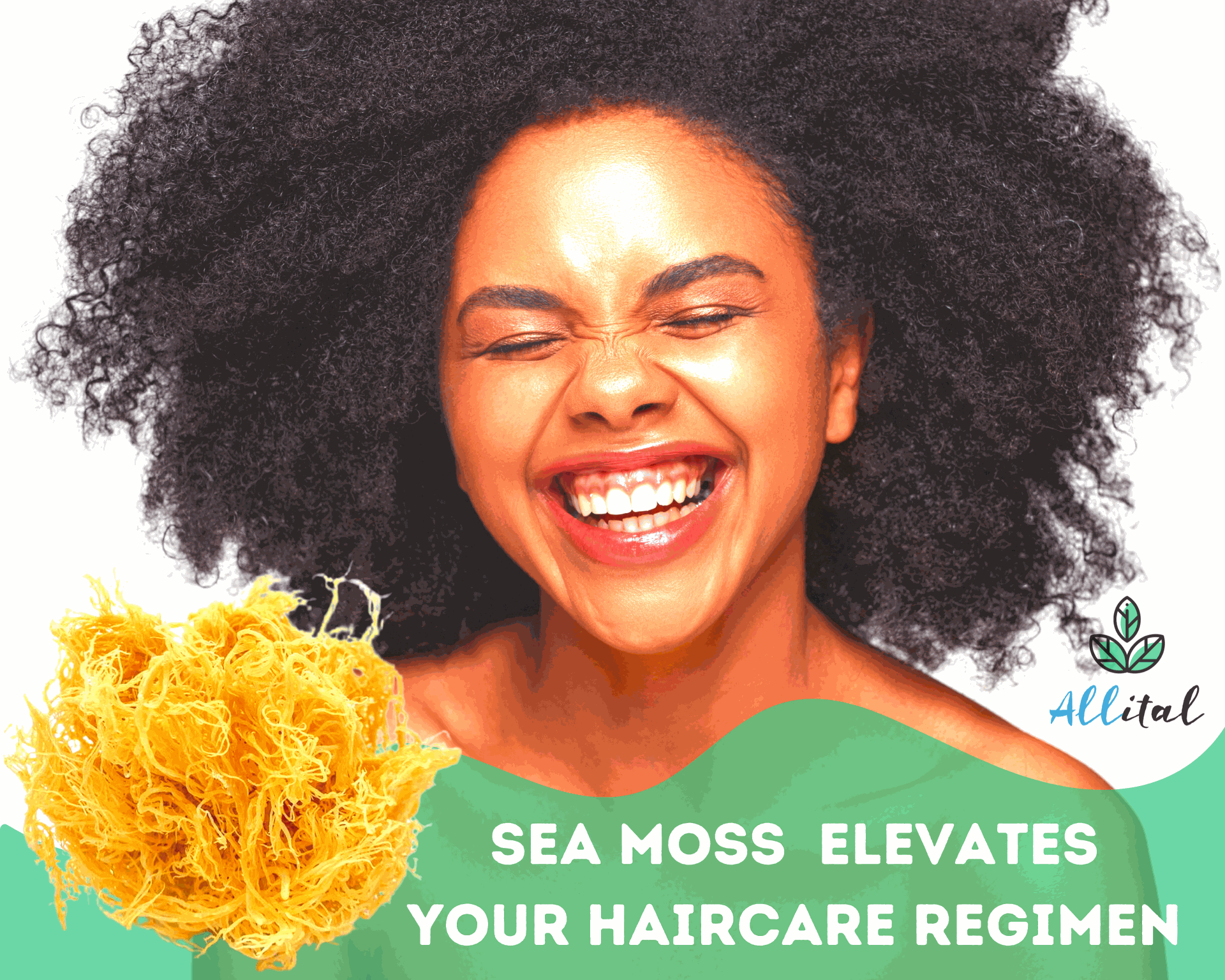
Nourishes the Scalp
Sea moss is rich in iodine, which is a mineral that is essential for healthy thyroid function. A healthy thyroid gland is necessary for maintaining a healthy scalp and promoting healthy hair growth. Additionally, sea moss contains anti-inflammatory compounds that can help to soothe an irritated scalp and reduce dandruff.
Protects Against Hair Loss
Sea moss is a natural source of silica, which is a mineral that is essential for healthy hair growth. Silica helps to strengthen hair strands and prevent breakage, reducing the risk of hair loss. Sea moss also contains antioxidants that can help to protect hair follicles from damage caused by free radicals.
How to Incorporate Sea Moss into Your Hair Care Routine
Sea moss is a versatile ingredient that can be used in many different ways to promote healthy hair for all hair types. Here are a few methods and DIY Sea Moss Recipes for Hair that you can try:
Sea Moss Gel: To make sea moss gel, soak a handful of dried sea moss in water for 24-48 hours until it softens and expands. Rinse the sea moss thoroughly and blend it with fresh water until it becomes a smooth gel-like consistency. You can use this gel as a hair mask or leave-in conditioner to nourish and strengthen your hair.

Seamoss Gel Hair Mask: To make a sea moss hair mask, mix 1 tablespoon of sea moss gel with 1 tablespoon of honey and 1 tablespoon of coconut oil. Apply the mixture to your hair and scalp and leave it on for 30 minutes before rinsing with warm water.
Sea Moss Smoothie: Add a spoonful of sea moss gel to your favorite smoothie recipe for a nutrient-rich boost. Sea moss is rich in vitamins and minerals that promote healthy hair growth, and adding it to your diet can help to improve the overall health and appearance of your hair.
Sea Moss Shampoo: Mix sea moss gel or powder with a gentle, sulfate-free shampoo to create a nourishing shampoo that will cleanse your hair while providing it with essential nutrients. This can help to promote healthy hair growth and improve the overall health of your hair.
Sea Moss Hair Oil: Mix sea moss gel with a carrier oil like coconut oil or jojoba oil to create a nourishing hair oil that will hydrate and strengthen your hair. Apply the oil to your scalp and hair, and leave it in for a few hours or overnight before washing it out with shampoo.
Sea Moss Tea Rinse: Brew a cup of sea moss tea by steeping a handful of dried sea moss in hot water for 10-15 minutes. Allow the tea to cool, and then use it as a hair rinse after shampooing to nourish and strengthen your hair.
By incorporating these sea moss DIY recipes for hair into your hair care routine, you can provide your hair with the essential nutrients it needs to grow strong and healthy.
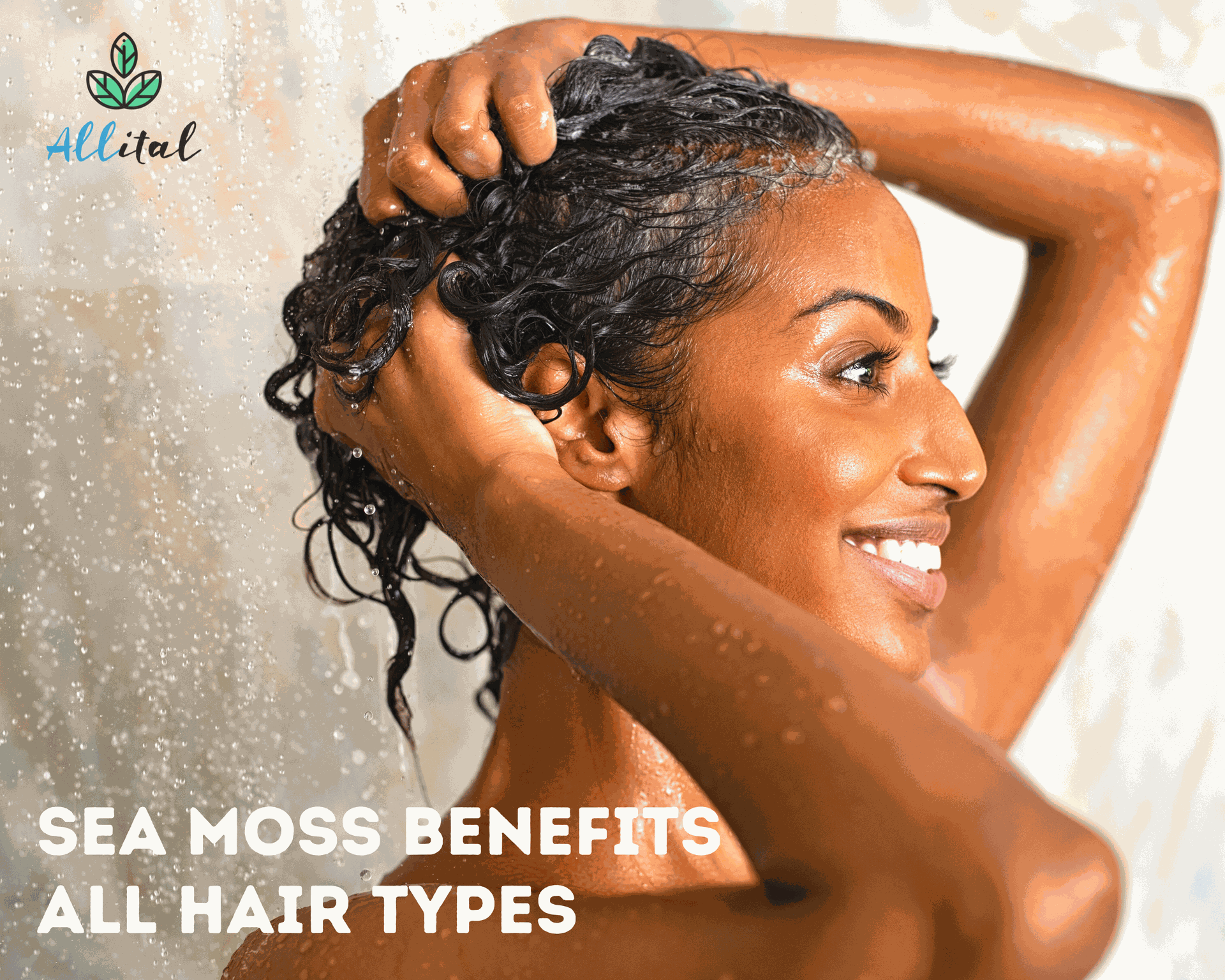
Tips for Purchasing Sea Moss for Hair Care
Sea moss is a popular ingredient for promoting healthy hair, but not all sea moss products are created equal. Here are some tips to consider when purchasing sea moss for hair care:
Choose high-quality sea moss: Look for sea moss that is harvested from clean waters and is free from contaminants. Organic and wild-harvested sea moss are good options.
Check the color and texture: The color of sea moss should vary from light brownish to purple depending on the type that you purchase. The texture should be slightly slimy. Avoid sea moss that is black or has a strong odor, as this may indicate spoilage.
Consider the form of sea moss: Sea moss can be purchased in various forms, such as dried, powder, capsule, or gel. Consider which form is most convenient and effective for your hair care needs.
Read the label: Check the label for the source and quality of the sea moss, as well as any additional ingredients or additives. Avoid sea moss products that contain artificial preservatives or chemicals.
Purchase from a reputable seller: Buy sea moss from a reputable seller who specializes in natural products and has positive customer reviews.
By taking these tips into consideration, you can ensure that you are purchasing high-quality sea moss for your hair care needs.
At Allital, we are committed to offering only sustainably harvested sea moss from St. Lucia in its natural raw sundried state which we use to make our consistently high-quality sea moss gels. We also provide a range of sea moss supplements ranging from our certified organic sea moss capsules with other ingredients such as bladderwrack, burdock root, and elderberry to our sea moss tincture. Whatever form of sea moss is more convenient for you, we have it. Check our shop for more details.
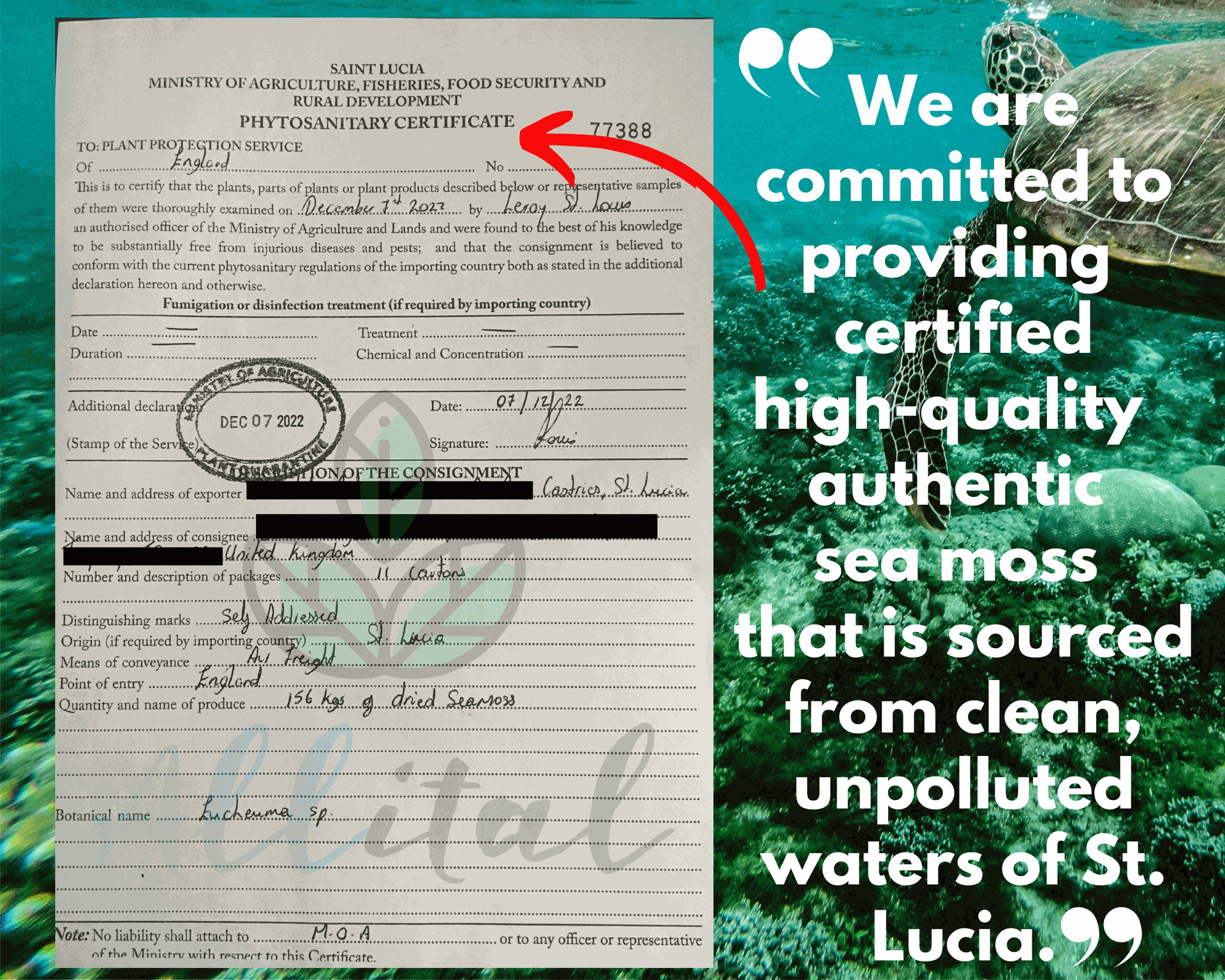
Conclusion
In summary, sea moss is a highly nutritious superfood that offers numerous benefits for all hair types. It promotes healthy hair growth, improves the condition of the hair, nourishes the scalp, and protects against hair loss. By incorporating sea moss into your hair care routine and diet, you can provide your hair with the essential nutrients it needs for healthy growth and shine while achieving luscious locks naturally and improving the overall health of your hair.
Sea Moss and Hair: FAQS
Is sea moss safe for all hair types?
Yes, sea moss can be used on all hair types. However, it may be more beneficial for those with dry or damaged hair, as it can help to hydrate and nourish the hair strands. But it may not be suitable for those with sensitive scalps or allergies to seaweed. It is always a good idea to do a patch test before using sea moss on your hair.
How long does it take to see results from using sea moss on hair?
The length of time it takes to see results from using sea moss on hair may vary depending on individual hair types and concerns. Some people may notice improvements in hair health and growth within a few weeks of using sea moss, while others may take longer.
Can sea moss be used as a replacement for conditioner?
Yes, sea moss can be used as a replacement for conditioner. Sea moss gel can be used as a leave-in conditioner or hair mask to hydrate and nourish the hair strands.
Where can I buy sea moss?
Sea moss can be purchased online or at health food stores in various forms, such as dried, powder, capsule, or gel. Ensure you buy from a reputable company with high-quality products.
For more Sea Moss and Hair commonly asked questions checkout this Blog.
REFERENCES:
Hwang, J., Yadav, D., Lee, P. C. W., & Jin, J-O. (2021). Immunomodulatory effects of polysaccharides from marine algae for treating cancer, infectious disease, and inflammation. Phytotherapy Research, 36(3), 921-936. https://doi.org/10.1002/ptr.7348
Umu, Ö. C. O., Rudi, K., & Diep, D. B. (2017). Modulation of the gut microbiota by prebiotic fibres and bacteriocins. Microbial Ecology in Health and Disease, 28(1), 1348886. https://doi.org/10.1080/16512235.2017.1348886
Pangestuti, R., Shin, K.-H., & Kim, S.-K. (2021). Anti-Photoaging and Potential Skin Health Benefits of Seaweeds. Marine drugs, 19(3), 172. https://doi.org/10.3390/md19030172
Gupta, A. K., & Nicol, K. (2004). The use of sulfur in dermatology. Journal of Drugs in Dermatology, 3(4), 427-431. https://pubmed.ncbi.nlm.nih.gov/15303787/
Leyden, J. J., McGinley, K. J., Mills, O. H., Kyriakopoulos, A. A., & Kligman, A. M. (1987). Effects of sulfur and salicylic acid in a shampoo base in the treatment of dandruff: a double-blind study using corneocyte counts and clinical grading. Journal of the American Academy of Dermatology, 39(6), 557-561. https://pubmed.ncbi.nlm.nih.gov/3301220/
Fluid and Electrolyte Balance. National Library of Medicine. Accessed 24/03/23. https://medlineplus.gov/fluidandelectrolytebalance.html
Houston et al., (2018). Efficacy of iron supplementation on fatigue and physical capacity in non-anaemic iron-deficient adults: A systematic review of randomised controlled trials. BMJ Open, 8(4), e019240. doi: 10.1136/bmjopen-2017-019240. https://www.ncbi.nlm.nih.gov/pmc/articles/PMC5892776/
Smyth, PPA. “Iodine, Seaweed, and the Thyroid” (2021) European Thyroid Journal. 2021;10(2):101-108. https://etj.bioscientifica.com/view/journals/etj/10/2/ETJ512971.xml
Trost, L. B., Bergfeld, W. F., & Calogeras, E. (2006). The diagnosis and treatment of iron deficiency and its potential relationship to hair loss. Journal of the American Academy of Dermatology, 54(5), 824-844. doi: 10.1016/j.jaad.2005.11.1104. https://pubmed.ncbi.nlm.nih.gov/16635664/
Almohanna, H. M., Ahmed, A. A., Tsatalis, J. P., & Tosti, A. (2018). The Role of Vitamins and Minerals in Hair Loss: A Review. Skin Appendage Disorders, 5(1), 9-25. doi: 10.1007/s13555-018-0278-6. https://www.ncbi.nlm.nih.gov/pmc/articles/PMC6380979/
Callahan, A. (2018, August 24). Do Collagen Supplements Help Skin, Hair, Nails and Joints? The New York Times. Retrieved from https://www.nytimes.com/2018/08/24/well/live/collagen-supplements-benefits.html
Oshimura, E., Abe, H., & Oota, R. (2007). Hair and amino acids: the interactions and the effects. Journal of cosmetic science, 58(4), 347-357. https://pubmed.ncbi.nlm.nih.gov/17728935/
Davis, M. G., Piliang, M. P., Bergfeld, W. F., Caterino, T. L., Fisher, B. K., Sacha, J. P., Carr, G. J., Moulton, L. T., Whittenbarger, D. J., & Schwartz, J. R. (2018). Scalp application of antioxidants improves scalp condition and reduces hair shedding in a 24-week randomized, double-blind, placebo-controlled clinical trial. Journal of drugs in dermatology: JDD, 17(5), 558-565. https://pubmed.ncbi.nlm.nih.gov/34424558/
FDA DISCLAIMER:
The statements made within this website have not been evaluated by the Food and Drug Administration. These statements and the products of this company are not intended to diagnose, treat, cure, or prevent any disease.
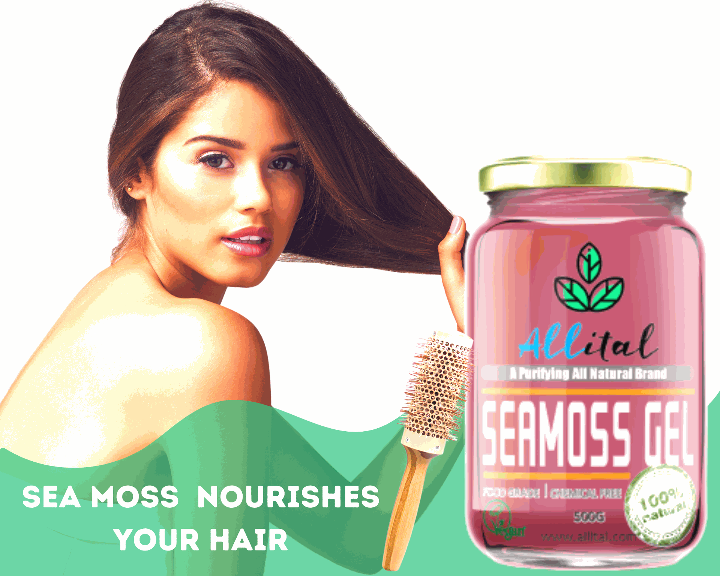

Sea Moss and Hair: Achieve Luscious Locks Naturally